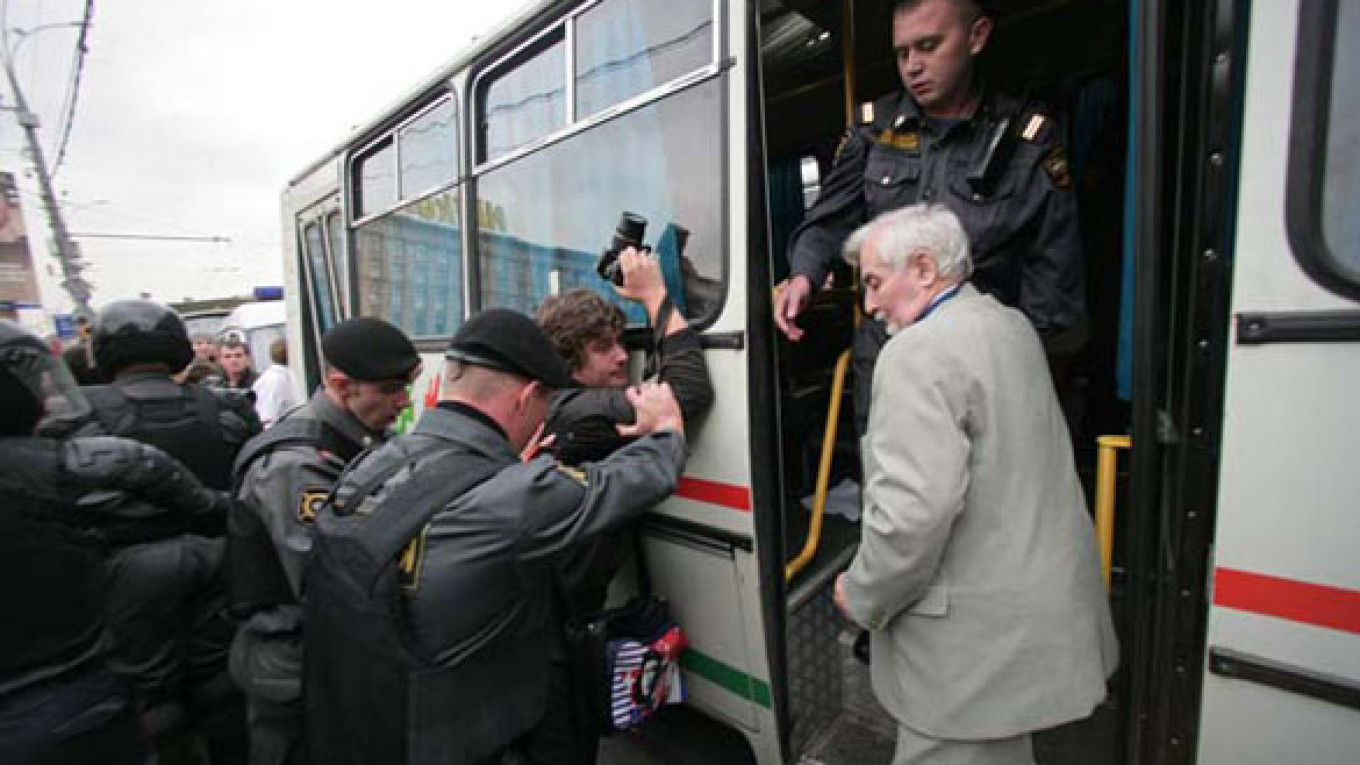As a public discussion of police reform wound up Wednesday with almost 21,000 comments on a government web site, opposition politicians and human rights advocates declared that the bill needed a complete overhaul.
The 11-chapter bill, published in early August on Zakonoproekt2010.ru, is a part of President Dmitry Medvedev's drive to reform the police force.
The chapters that sparked the most debate on the web site concern police officers' responsibilities and rights, with more than 1,500 and 1,400 comments, respectively, as of Wednesday afternoon. The least popular item, "Work Discipline of the Police," only had about 50 comments.
The bill, which is to replace a 1991 law on the police, is supposed to provide a complete list of the rights and responsibilities of the police, whose activities are currently regulated by hundreds of amendments and bylaws to the main law.
Medvedev also proposed to replace the Bolshevik-era name for the force, “militia,” with “police.”
It was unclear Wednesday whether he planned to proceed with this change, which would cost several hundred million rubles.
Medvedev promised in August to revise the draft, taking the public's opinions into consideration before submitting the bill to the State Duma, which is expected to happen this fall. The pledge was reiterated Monday by Interior Minister Rashid Nurgaliyev.
But some human rights advocates and lawmakers said they planned to draft alternative bills from scratch.
One version will be prepared by the president's own human rights council, which discussed the draft at a meeting Tuesday.
"The current version is so bad that we decided that it would be easier to rewrite it than adjust it," Yelena Panfilova, a member of the council and director of Transparency International's Russia office, told The Moscow Times.
The liberal Yabloko party said in a statement that its legal experts would continue working on their own alternative bill, which is based on the Kremlin's but already has about 150 amendments, including increased public supervision for police and more rights for detainees. Yabloko said detainees should be guaranteed acceptable detention conditions and the right to make a telephone call after being arrested, something that Medvedev's draft denied them.
Medvedev has said the bill should close all loopholes for potential abuse of power by police, who are notoriously violent and corrupt.
The bill in its present form would also step up the centralization of the police force, making it more dependent on the federal authorities and less on the local citizens it is supposed to serve.
In an indication that even top officials lack complete unity on police reform, Justice Minister Alexander Konovalov called on Wednesday for the introduction of popular elections for district police officers, a measure that the Kremlin did not see fit to include in its draft.
Such elections “shouldn't be a carbon copy of sheriff elections in America,” Konovalov said, Itar-Tass reported. But, he added, “People should themselves select those who protect them.”
A Message from The Moscow Times:
Dear readers,
We are facing unprecedented challenges. Russia's Prosecutor General's Office has designated The Moscow Times as an "undesirable" organization, criminalizing our work and putting our staff at risk of prosecution. This follows our earlier unjust labeling as a "foreign agent."
These actions are direct attempts to silence independent journalism in Russia. The authorities claim our work "discredits the decisions of the Russian leadership." We see things differently: we strive to provide accurate, unbiased reporting on Russia.
We, the journalists of The Moscow Times, refuse to be silenced. But to continue our work, we need your help.
Your support, no matter how small, makes a world of difference. If you can, please support us monthly starting from just $2. It's quick to set up, and every contribution makes a significant impact.
By supporting The Moscow Times, you're defending open, independent journalism in the face of repression. Thank you for standing with us.
Remind me later.


